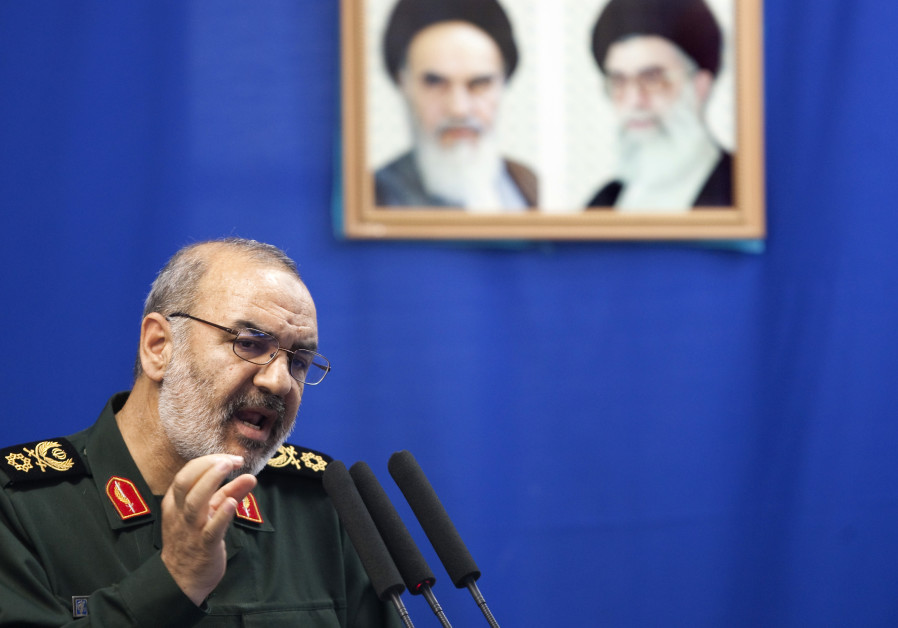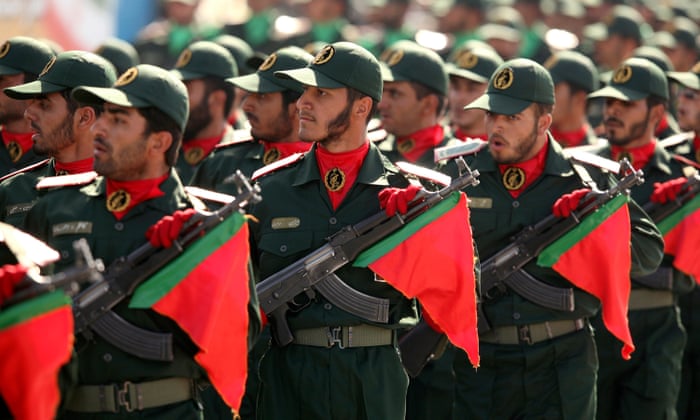Iranian "Resistance"
"The United States just withdrew from the Iranian nuclear deal. The move is fully justified not only on the grounds security, but primarily because Iran's Iranian Khomeinist revolution is a deadly and propulsive ideology that the West cannot allow to become a nuclearized one"
"The idea of using children as human bombs originated in was also advanced by Iran. As the German scholar Matthias Küntzel wrote, 'Khomeini was the first to develop a full-blown death cult'. During the Iran-Iraq war, the Ayatollah Khomeini imported thousands of plastic keys from Taiwan. The ayatollah sent these Iranian children through the Iraqi minefields in the direction of the enemy, to open a gap with their bodies. Before each mission, Iranian children were given a key to hang around their neck; they were told it would open the doors to paradise."
"Since then, the baby suicide bombers made their appearance in Gaza, Iraq, Syria, Nigeria and Afghanistan."
"U.S. flag-burning and chanting 'Death to America' became common in the Middle East only after the Iranian takeover of the US embassy in Teheran. When Donald Trump pulled the US out of the nuclear deal, Iranian MPs in their Parliament burned the American flag. In the last few months, Iranian girls who took off their veil were arrested and beaten. It was Iran that made chador a symbol of political Islam. A woman wrapped in a black chador, the most severe form of hijab, has become one of the most visible images of the Islamic Republic."
"The archipelago of political Islam in Europe, from Tariq Ramadan to the Muslim Brotherhood, revolves around the orbit of the Qatar-Iran axis. The Egyptian Muslim Brotherhood openly sided with Khomeini's revolutionaries as they overthrew the Shah, and now threatens Saudi Arabia and the UAE and others in the region."
"The Iranian ayatollahs were the first formally to persecute the Christian populations in the Middle East. Today, Iran is on list of Open Doors' ten worst countries for Christians. The idea of attacking Jewish communities around the world is also an Iranian invention: in 1992 and 1994, the Jewish community and the Israeli embassy in Buenos Aires were blown up. Until Iran's Revolution, no country had promoted a false Holocaust denial."
Giulio Meotti, Italian journalist, author, Cultural Editor, Il Foglio
"Resistance is the only way to confront these enemies [the United States, Israel, Saudi Arabia], not diplomacy."
"Exiting the deal [nuclear agreement] and their concerns over Iran's missile work are excuses to bring our nation to its knees."
"Listen! Any war that occurs will result in your [Israel] annihilation. You have no escape route but to the sea. Don’t reply on your air bases. They are within the range [of our missiles] and will be made unusable in no time."
"We know you very well. You’re very vulnerable. You have no depth or rearguard… Every spot in your occupied territory is an intersection of fire, from the north to the west. This is a new phenomenon. You don’t have a way to escape and live in the dragon’s mouth."
Brigadier General Hossein Salami, deputy head, Islamic Revolutionary Guards Corps
 |
| Hossein Salami, deputy head of Iran's Revolutionary Guard, speaks during Tehran's Friday prayers .. (photo credit: MORTEZA NIKOUBAZI/ REUTERS) |
The removal of the Shah of Iran and the return of Ayatollah Ruhollah Khomeini from exile to establish the Islamic Republic of Iran marked a gradual and relentless change taking place in the Middle East, where Persian Iran's Shia sect began its influence-peddling in a geography that is majority Arab and Sunni Muslim. Iran's first success was to persuade Shiites in Lebanon to adopt Iran's death cult of martyrdom, and to that end, initiated, trained and armed their proxy militia Hezbollah which eventually became part of the Lebanese government in that tribal, ethnic and religion-fractured country.
In the wake of the Arab Spring uprisings other opportunities presented to Iran to remake the influence and control of the Middle East in its own image. Syria's civil war gave it the opportunity to intervene and to support the minority Shiite government of Bashar al-Assad in its bloody war against Sunni Syrian 'terrorists'. When the U.S. invasion of Iraq removed Saddam Hussein from power along with his minority Sunni stranglehold, Iran supported the Shiite Iraqi minority that took power. When Houthi rebels in Yemen asserted themselves against the majority Sunnis, Iran armed and aided them.
In the U.S., alarm was raised over the prospect of this extremist fanatical Sharia-led theocracy exerting its appeal to the wider radical elements populating the Middle East. Grand Ayatollah Khomeini's siege of the American Embassy in Tehran and hostage-taking of U.S. diplomats failed to endear his rule to the U.S. who became the "Great Satan", while the "Zionist entity" became the "Little Satan", both of which were recognized as enemies; the former to be resisted, the latter to be exterminated.
 |
| Members of Iran’s revolutionary guard on parade in Tehran. Photograph: Morteza Nikoubazl/Reuters |
Sunni Arab countries -- suspicious and nervous over Iranian muscle-flexting -- endowed with vast petroleum resources, bought technologically advanced, sophisticated weaponry for their military, but it is doubtful that the weapons will ever be used to their full potential, for as fighting forces there appears to be a lack of something essential in organizing a disciplined and effective military, proven time and again when combined Arab armies attacked Israel. Israel, on the other hand, also possesses strategic and updated weapons, which it knows how to use with precision and to great effect.
The nation that was once an outlier among Arab nations is now grudgingly acknowledged as a permanent fixture, one that can be relied upon as an ally in facing the threats represented by Iran's increasing domination in its Shiite axis of Syria, Iraq, Lebanon and Yemen. With President Donald Trump's withdrawal of the U.S. from the international nuclear agreement with Iran, U.S. sanctions have been reimposed, once again burdening the Iranian Republic which squandered much of the billions it received on signing the agreement, on pursuing its Shiite axis in Syria and Lebanon.
Iran itself has named its "axis of resistance", borrowing ironically and purposely from former president George W. Bush's "axis of evil" designation for Iran and its satrapies. Iran, for all its growing influence, and its support of terrorist groups to match its own terrorist proclivities, has been backed into a corner. The loyalties it bought, with all that incoming cash, from Lebanon, Syria and Iraq, let alone Hamas in Gaza, are becoming fraught with concern; lacking financial support they are all unable to act to their fullest potential.

Cornered rats snarl and bite. Iran's is now a poor economy whose neighbours have outspent it with conventional weapons. It harboured an irresistible determination to gain weapons of mass destruction that would overwhelm conventional weapons in the hands of its neighbours. The deal that bought Iran time with its nuclear technology, did nothing to deter it from ongoing designs to perfect ballistic missile delivery systems, making clear its intentions for the near future. It was the unrepentant ballistic missile tests and Iran's steady encroachment in Iraq and Syria that led to its loss of U.S. support for the nuclear agreement.
The frustration that led Iran to respond to Israeli airstrikes on weapons it was providing to Hezbollah transiting through Syria, by firing rockets toward Israel and Israel's warplane bombing of Iranian military targets in Syria question whether the Islamic Republic is on the brink of becoming more reckless, teetering beyond mere threats to active military assaults on its big and little "Satan" enemies.
 |
| IRGC troops (file photo) |
Labels: Conflict, Iran, Israel, Nuclear Agreement, Threats, United States
0 Comments:
Post a Comment
<< Home